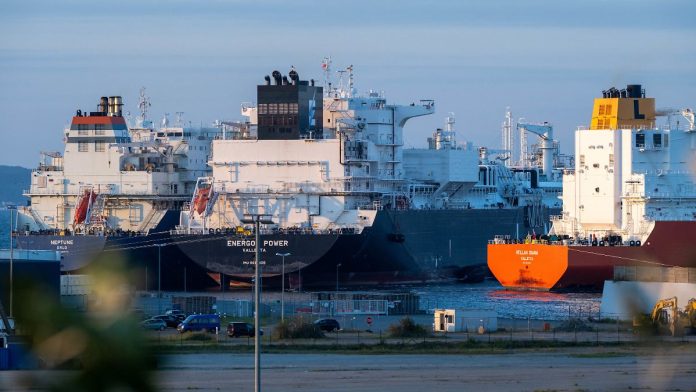After delays and protests
LNG terminal off Rügen goes into regular operation
This audio version was artificially generated. More info | Send feedback
The LNG tanker “Hellas Diana” is unloading liquid gas regularly for the first time off the holiday coast of the Baltic Sea island of Rügen. This means that one of the most hotly contested projects in the German energy transition is starting operations.
The “German Baltic Sea” liquefied natural gas terminal on the island of Rügen has started regular operations. This was announced by the operator Deutsche Regas. There had previously been delays several times. The LNG tanker “Hellas Diana” unloaded liquefied natural gas (LNG) at the terminal from Wednesday to Friday last week. For the first time in the world, LNG was loaded onto two interconnected regasification ships at the same time.
According to information from the Internet tracking system Marine Traffic, the approximately 300 meter long tanker came from Freeport in the US state of Texas. Liquefied natural gas can be landed on the island of Rügen via the regasification ships (FSRU – Floating Storage and Regasification Unit) “Energos Power” and “Neptune”.
The managing partner of Deutsche Regas, Ingo Wagner, spoke of a milestone after months of meticulous preparatory work. “The start of regular operations shows the central importance of the 'German Baltic Sea' energy terminal for the security of supply in Germany, Austria and Eastern Europe,” said Wagner.
Several urgent applications fail
After being converted into gas, the LNG can be fed into the German distribution network via a natural gas connection line to Lubmin. Deutsche Regas puts the targeted total capacity at 13.5 billion cubic meters of gas per year, which corresponds to around 15 percent of Germany's current annual consumption.
The federal government included the construction of the terminal on the east coast of Rügen, which is primarily used for tourism, in the LNG Acceleration Act in order to further ensure the gas supply in Germany. But doubts are increasing that there is a threat of a gas shortage, which is the decisive reason for the construction of special terminals for gas tankers. One of the strongest critics of the project is the German Environmental Aid (DUH), which speaks of an “expensive and unnecessary investment ruin”.
The municipality of Binz has already warned several times of “horrendous damage” to tourism, nature and the climate. She argues that the terminal is no longer necessary to secure energy supplies in Germany in winter.
In April, the Federal Administrative Court dismissed the lawsuits of two environmental organizations against the gas pipeline from Mukran to Lubmin, which connects the floating LNG terminals to the gas pipeline network. Urgent applications from the German Youth Hostel Association, the municipality of Binz and two private property owners against the business also failed in June.


